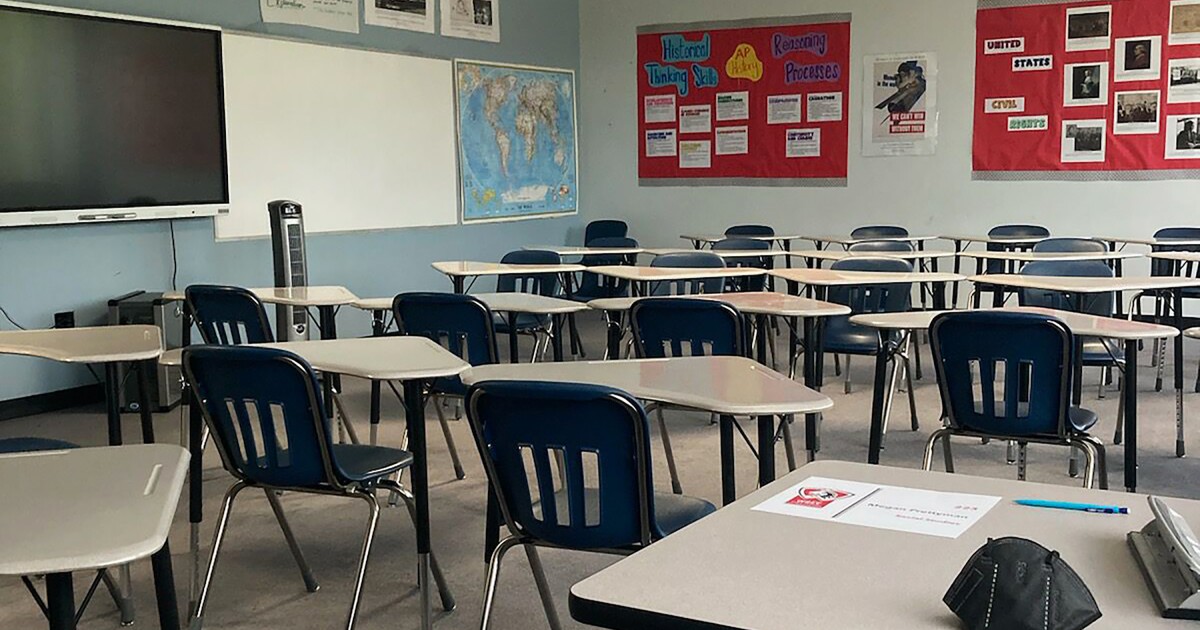It’s been less than a year since lawmakers passed the education overhaul known as Arkansas LEARNS.
To recap, the act gives parents money in the form of vouchers to enroll their children in private, religious or homeschool. And note: supporters call the voucher program “Education Freedom Accounts.”
Most kids in the program are getting over $6,000 from the state per year. As of now, 94 schools and just under 5 thousand students are using the money.
Arkansas Education Secretary Jacob Oliva is proud of the law so far. For the most part, he and the other proponents of LEARNS have gotten exactly what they wanted.
“I am excited to report that because of the commitment of this legislation and the administration and the hard work of all the individuals, that in this most recent ranking Arkansas received an A grade and was ranked number one and two in the nation in parental empowerment,” Oliva said, testifying before the Arkansas Legislative Council in October.
He is referencing a study done by ALEC, a conservative organization that helps draft school choice policies. The group ranks Arkansas second only to Florida, Oliva’s home state, in so-called “parental empowerment.”
That’s a term used frequently by proponents of school choice. Advocates say vouchers open up different forms of education to everyone, especially kids from lower socioeconomic backgrounds.
But, the Arkansas Department of Education has been pretty open about the places where the voucher money is going. Most of the money, 95%, goes to either kindergarteners or kids already enrolled in private schools, something Gov. Sarah Huckabee Sanders acknowledged at a recent event.
“Most families choose and will continue to choose their neighborhood public school,” she said. “And as someone who graduated from their neighborhood public school, I know how important that sense of community that it can provide. But that one-size-fits-all model that Arkansas used to have let far too many students slip through the cracks.”
The governor has been adamant that the money given out by Arkansas LEARNS would be phased in over time. The state lists seven criteria that put kids at the front of the line for the voucher program, such as being homeless, attending a failing school, or having a special needs diagnosis. Low family income is not one of the seven criteria.
Over 2,000 participants have some kind of special needs diagnosis. However, as originally reported by the Arkansas Times, these diagnoses don’t live up to the standards of the Americans With Disabilities Act.
Allison Sweatman is a social worker who helps special needs kids in public schools access services. She says, in a traditional public school, qualifying to get special services takes time.
“It includes one or more examinations one or more tests,” she said. “And then the test has to qualify that child under the diagnosis.”
The Arkansas Times obtained documents through the Freedom of Information Act showing kids were qualifying for diagnosis using only a doctor’s report. Sweatman says that’s unusual.
“Something that I have told many many parents is that a doctor’s note is not enough to qualify your child for services.”
Sweatman says schools typically won’t accommodate students under the Americans With Disabilities Act with such thin qualifications. So, she finds it strange that students can get voucher money with only a doctor’s note.
Many schools receiving state money are small, faith-based and located in former warehouses or churches. For example, a school called Cornerstone Montessori Christian in Benton has only five students, four of whom are getting voucher money.
Another small religious school called Joshua Academy in Van Buren started enrolling kids this year. At the school, 68% of the kids are getting voucher money. The school is housed on the property of a nondenominational church.
Another school, Cornerstone Christian Academy in the small town of Tillar, receives hundreds of thousands from the state. The school’s handbook says students will be barred from attendance if they “profess any sort of sexually immoral lifestyle including, homosexuality, transgenderism.”
North River Christian Academy in North Little Rock also has language in its handbook talking about the so-called traditional sexual ethic. At that school, 30 kids out of 55 get state money.
Along with LEARNS money, families can also apply for the ACE scholarship. This is a private scholarship for kids of a lower socio-economic status. Gov. Sanders touted ACE at a luncheon earlier this year.
“You were empowering parents long before government was,” she said. “And you continue to play a critical role in helping low-income families break out of the cycle of poverty.”
Per a law passed by the legislature in 2021, people who give money to this scholarship get 100% back on their taxes from the state. Carl Davis is a tax researcher for the Institute of Taxation and Economic Policy whose work involves taxes and school choice. He says these refunds exist in many states.
“People making the so-called donation aren’t losing any money at all,” he said. “So, it’s not usually the way charitable giving incentives work in the tax policy. It is very much a movement of public money into private schools with these so-called donors just acting as middlemen but not putting any of their own money forward.”
Many of the schools receiving state money do not post their tuition rates online. The website of Central Arkansas Christian Schools, one of the largest religious schools in the region, instructs prospective parents to use the ACE scholarship and LEARNS voucher money to calculate what the tuition will be for them.
All of this means the state is seeing a huge shift toward policies emphasizing school choice.
Arkansas LEARNS is slated to roll out over the next three years, with any student eventually being able to apply for voucher money, and schools that have been around for more than a year becoming eligible.


























